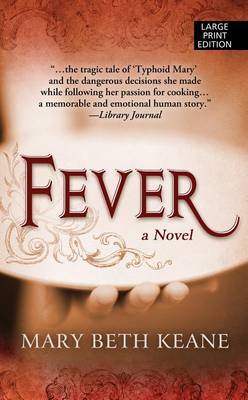
layawaydragon
Written on Jan 3, 2013
Recommend: For historical fiction fans, those interested in the human side of science and disease and contemporary fans may find something here to like as well
I remember learning about Typhoid Mary in school. We learned about Typhoid, asymptomatic carriers and the victims of renegade, heartless Mary. When I made the mistake of commenting on how awful it must have been for Mary, the room sat in silence and everyone stared at me. Like something was wrong with me for thinking about Mary as a person, for thinking I could sympathize with Typhoid victims and with the carrier too. After a beat, the teacher picked up with, "Well, yes...The Department of Health handles things differently now, but you must understand what they were dealing with."
All I can think of was, "Don't you mean who?"
That moment cemented the story of Typhoid Mary in my mind.
This book, this story, this Mary makes me want to track down those in my class and send them a copy of this book to say, "SEE, I wasn't stupid.".
I think starting with Mary's first experience in confinement was smart.
After all that's where her story starts, where she becomes more than just one of the thousands of nameless, faceless immigrant women. Plus I think it sets up the story well so people understand just why she wasn't especially willing to be receptive or friendly to the doctors.
I like this portrayal of Mary. She is a no nonsense, hard working independent woman that didn't back down. She's uppity and she doesn't care what other people think. She wasn't all smiles and sunshine normally because her life wasn't all smiles and sunshine. And there's nothing wrong with that.
From beginning to end, I was rooting for her. I wanted her to find a way to live her life happily and without risk to others. I wasn't frustrated with her. I just wanted to re-write history for her (and the people she ended up hurting) but that's not possible. I didn't have a negative reaction to her. I just kept saying, "oh, no." I was completely wrapped up in Mary's tale and the descriptive, flowing writing. Even without knowing the story of Typhoid Mary, it's obvious how it is going to end. The story weaved is still entrancing.
The key to understanding Mary is common. It's easy to see in others but hard to see ourselves doing it. The illuminating quote,
"she wondered whether it was possible for a person to know something and to not know something at the same time."
Ah, cognitive dissonance. Of course it's possible. Everybody does it. Cognitive dissonance wasn't even theorized until 20 years after Mary's death.
For more understanding Mary and as far as her fury is concerned...I must say I'm with Mary that a man would've been treated much differently as the first carrier and much, if not all, of her poor treatment comes from what she was (single immigrant non religious woman) than her actual personality. I totally understand that being infuriating. I felt fury for her. It’s absolutely chilling to be put in her shoes.
